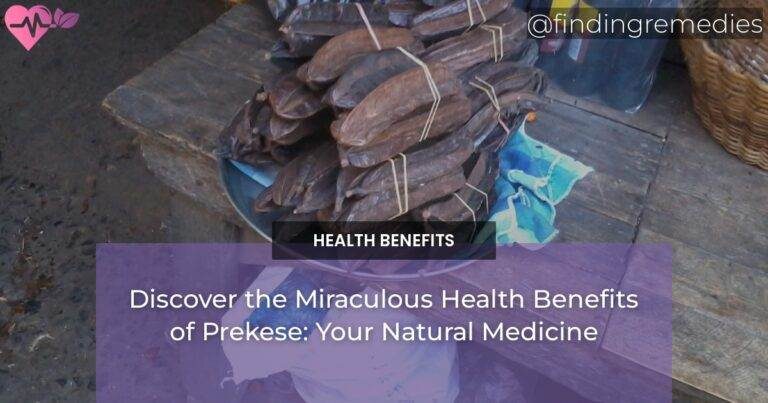Prekese, also known as Tetrapleura tetraptera, is a fruit that is commonly found in West Africa. It has been used for centuries in traditional medicine to treat various ailments. Prekese is an excellent source of nutrients and natural compounds that offer numerous health benefits. In this article, we will explore the nutrition profile, natural compounds, and health benefits of prekese as a medicinal food.
Table of Contents
Nutrition Profile of Prekese
Prekese is rich in various nutrients, including:
- vitamins: Prekese contains high levels of vitamin C, vitamin A, and B-vitamins.
- Minerals: Prekese is an excellent source of calcium, iron, magnesium, and potassium.
- Protein: Prekese provides a moderate amount of protein.
- Fiber: Prekese is high in dietary fiber.
Natural Compounds found in Prekese
Prekese contains a variety of natural compounds that offer medicinal properties, including:
Phytochemicals in Prekese
Prekese contains various phytochemicals, including:
- Polyphenols: Prekese is a rich source of polyphenols, including flavonoids, tannins, and phenolic compounds.
- Alkaloids: Prekese contains alkaloids that have antimicrobial properties.
- saponins: Prekese contains saponins that have anti-inflammatory properties.
Minerals in Prekese
Prekese is also rich in minerals, including:
- Calcium: Prekese is a good source of calcium, which is essential for bone health.
- Magnesium: Prekese contains high levels of magnesium, which is important for muscle and nerve function.
- Iron: Prekese is a good source of iron, which is necessary for red blood cell production.
Health Benefits of Prekese
ALSO READ
Prekese for Diabetes Management
Prekese has been shown to have potential benefits for people with diabetes. It contains natural compounds that can help regulate blood sugar levels, including polyphenols and flavonoids. These compounds help to slow down the absorption of glucose in the bloodstream, which can help prevent blood sugar spikes.
Prekese for Digestive Health
Prekese is rich in dietary fiber, which is essential for digestive health. Fiber helps to regulate bowel movements and prevent constipation. Prekese also contains natural compounds that have antimicrobial properties, which can help prevent the growth of harmful bacteria in the digestive tract.
ALSO READ
Prekese for Immune System Support
Prekese contains natural compounds that have immune system-boosting properties. These compounds, including polyphenols and flavonoids, can help support the immune system by fighting off harmful bacteria and viruses.
Prekese for Heart Health
Prekese is an excellent source of potassium, which is important for heart health. Potassium helps to regulate blood pressure and prevent hypertension. Prekese also contains natural compounds that have anti-inflammatory and antioxidant properties, which can help reduce the risk of heart disease.
Prekese for Anti-inflammatory Properties
Prekese contains natural compounds that have anti-inflammatory properties, including saponins and polyphenols. These compounds can help reduce inflammation in the body, which is linked to numerous chronic diseases.
Prekese for Antioxidant Properties
Prekese is rich in antioxidants, including vitamin C and polyphenols. These compounds help to fight off harmful free radicals in the body, which can damage cells and contribute to the development of chronic diseases.
Effects of Cooking and Proper Storage of Prekese
The natural compounds found in prekese can be affected by cooking and storage methods. To maximize the nutritional benefits of prekese, it is best to consume it raw or lightly cooked. Proper storage is also essential to preserve the natural compounds in prekese. It should be stored in a cool, dry place away from direct sunlight.
Risk Factors and Precautions in Using Prekese as a Medicinal Food
Prekese is generally safe for consumption when used in moderation. However, there are some precautions to keep in mind:
- Prekese may interact with certain medications, such as blood thinners.
- People with kidney disease should avoid consuming prekese due to its high potassium content.
- Prekese may cause allergic reactions in some people.
Can Betaine and Prekese be Used Together for Maximum Health Benefits?
When it comes to achieving incredible health benefits, combining betaine and prekese can be a winning strategy. Both of these powerful natural substances are known for their ability to promote overall wellness and support various bodily functions. By using them together, you can potentially maximize their effectiveness and enjoy a range of positive health outcomes.
Can Persimmons and Prekese be Used Together as Natural Medicine?
The combination of persimmons and Prekese can be used as a natural medicine due to the persimmons health benefits and tips. Both fruits are rich in nutrients and antioxidants, which can boost the immune system and aid in digestion. Together, they make a powerful natural remedy for various health issues.
Conclusion: The Future of Prekese as a Medicinal Food
Prekese has a long history of use in traditional medicine and is now gaining recognition for its medicinal properties. Its rich nutrition profile and natural compounds make it an excellent addition to a healthy diet. As research on prekese continues, we may discover even more health benefits of this versatile fruit.

